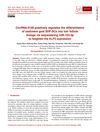 14 citations,
April 2019 in “Genes”
14 citations,
April 2019 in “Genes” Researchers found a genetic region that influences the number of coat layers in dogs.
 26 citations,
April 2019 in “Genes”
26 citations,
April 2019 in “Genes” lncRNA XLOC_008679 and gene KRT35 affect cashmere fineness in goats.
16 citations,
December 2020 in “PloS one” Researchers found WNT10A to be a key gene in developing goat hair follicles.
 35 citations,
May 2019 in “Frontiers in genetics”
35 citations,
May 2019 in “Frontiers in genetics” Non-coding RNAs play key roles in the hair growth cycle of Angora rabbits.
 July 2016 in “Experimental Dermatology”
July 2016 in “Experimental Dermatology” New treatments for hair growth and psoriasis may be possible, and gene differences could affect baldness and the severity of skin conditions.
 143 citations,
September 2008 in “Experimental gerontology”
143 citations,
September 2008 in “Experimental gerontology” Skin aging is due to impaired stem cell mobilization or fewer responsive stem cells.
 60 citations,
August 2008 in “Human molecular genetics online/Human molecular genetics”
60 citations,
August 2008 in “Human molecular genetics online/Human molecular genetics” A position effect on the TRPS1 gene causes excessive hair growth in humans and mice.
 48 citations,
May 2008 in “Drug Discovery Today: Disease Mechanisms”
48 citations,
May 2008 in “Drug Discovery Today: Disease Mechanisms” Hair follicles offer promising targets for delivering drugs to treat hair and skin conditions.
 2 citations,
May 2018 in “Expert opinion on orphan drugs”
2 citations,
May 2018 in “Expert opinion on orphan drugs” Newborn screening and gene therapy are expected to improve outcomes for Omenn syndrome patients.
 9 citations,
February 2022 in “Archives animal breeding/Archiv für Tierzucht”
9 citations,
February 2022 in “Archives animal breeding/Archiv für Tierzucht” A circular RNA helps cashmere goat hair cells become hair follicles by blocking a molecule to boost a gene important for hair growth.
 67 citations,
August 2013 in “International Journal of Cosmetic Science”
67 citations,
August 2013 in “International Journal of Cosmetic Science” Hair greying is caused by oxidative stress damaging hair follicles and melanocytes.
 26 citations,
December 2017 in “Journal of Investigative Dermatology”
26 citations,
December 2017 in “Journal of Investigative Dermatology” Disrupting Notch signaling in blood vessels increases scarring during wound healing in mice.
9 citations,
June 2017 in “Pharmacological Reports” ATP-sensitive potassium channels play a role in chloroquine-induced itch in mice.
3 citations,
February 2021 in “FEBS open bio” Camellia japonica extract may improve scalp health and promote hair growth.
 20 citations,
June 2019 in “Experimental Dermatology”
20 citations,
June 2019 in “Experimental Dermatology” The research suggests that autophagy-related genes might play a role in causing alopecia areata.
Certain short peptides can increase root hair growth in tobacco plants.
 January 2019 in “Advances in stem cells and their niches”
January 2019 in “Advances in stem cells and their niches” Skin health and repair depend on the signals between skin stem cells and their surrounding cells.
 10 citations,
March 2022 in “Communications biology”
10 citations,
March 2022 in “Communications biology” A new non-invasive method can analyze skin mRNA to understand skin diseases better.
 46 citations,
April 2016 in “Journal of Investigative Dermatology”
46 citations,
April 2016 in “Journal of Investigative Dermatology” New genes found linked to balding, may help develop future treatments.
 November 2023 in “Scientific Reports”
November 2023 in “Scientific Reports” A gene mutation in Lama3 is linked to a common type of hair loss.
August 2022 in “Biomedicines” Turning off the Lhx2 gene in mouse embryos leads to slower wound healing and scars.
 31 citations,
February 2014 in “Journal of dermatological science”
31 citations,
February 2014 in “Journal of dermatological science” Placental growth factor may help treat hair loss.
 52 citations,
May 2015 in “PLOS Genetics”
52 citations,
May 2015 in “PLOS Genetics” miR-22, a type of microRNA, controls hair growth and its overproduction can cause hair loss, while its absence can speed up hair growth.
7 citations,
November 2018 in “British Journal of Dermatology” Alopecia areata is caused by immune system issues, and JAK inhibitors might help treat it.
 56 citations,
February 2006 in “American journal of physiology. Cell physiology”
56 citations,
February 2006 in “American journal of physiology. Cell physiology” Steroid sex hormones activate matriptase in prostate cancer cells but not in breast cancer cells.
 10 citations,
July 2011 in “Wound Repair and Regeneration”
10 citations,
July 2011 in “Wound Repair and Regeneration” New antiscarring strategies show promise, including drugs, stem cells, and improved surgical techniques.
 23 citations,
September 2015 in “International Journal of Molecular Medicine”
23 citations,
September 2015 in “International Journal of Molecular Medicine” Activating ER-β, not ER-α, improves skin cell growth and wound healing.
 260 citations,
June 2011 in “Cell”
260 citations,
June 2011 in “Cell” Wnt signaling is crucial for pigmented hair regeneration by controlling stem cell activation and differentiation.
 39 citations,
August 2008 in “Growth hormone & IGF research”
39 citations,
August 2008 in “Growth hormone & IGF research” Raspberry ketone may help grow hair and improve skin elasticity.
10 citations,
November 2008 in “Veterinary Dermatology” The mouse hairy ears mutation causes longer ear hair due to changes in gene expression.























